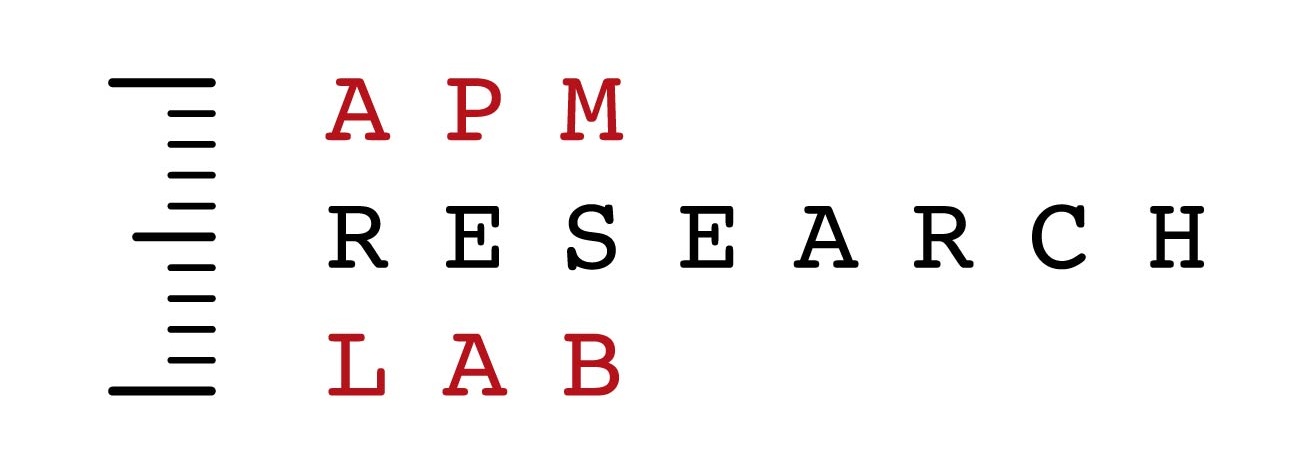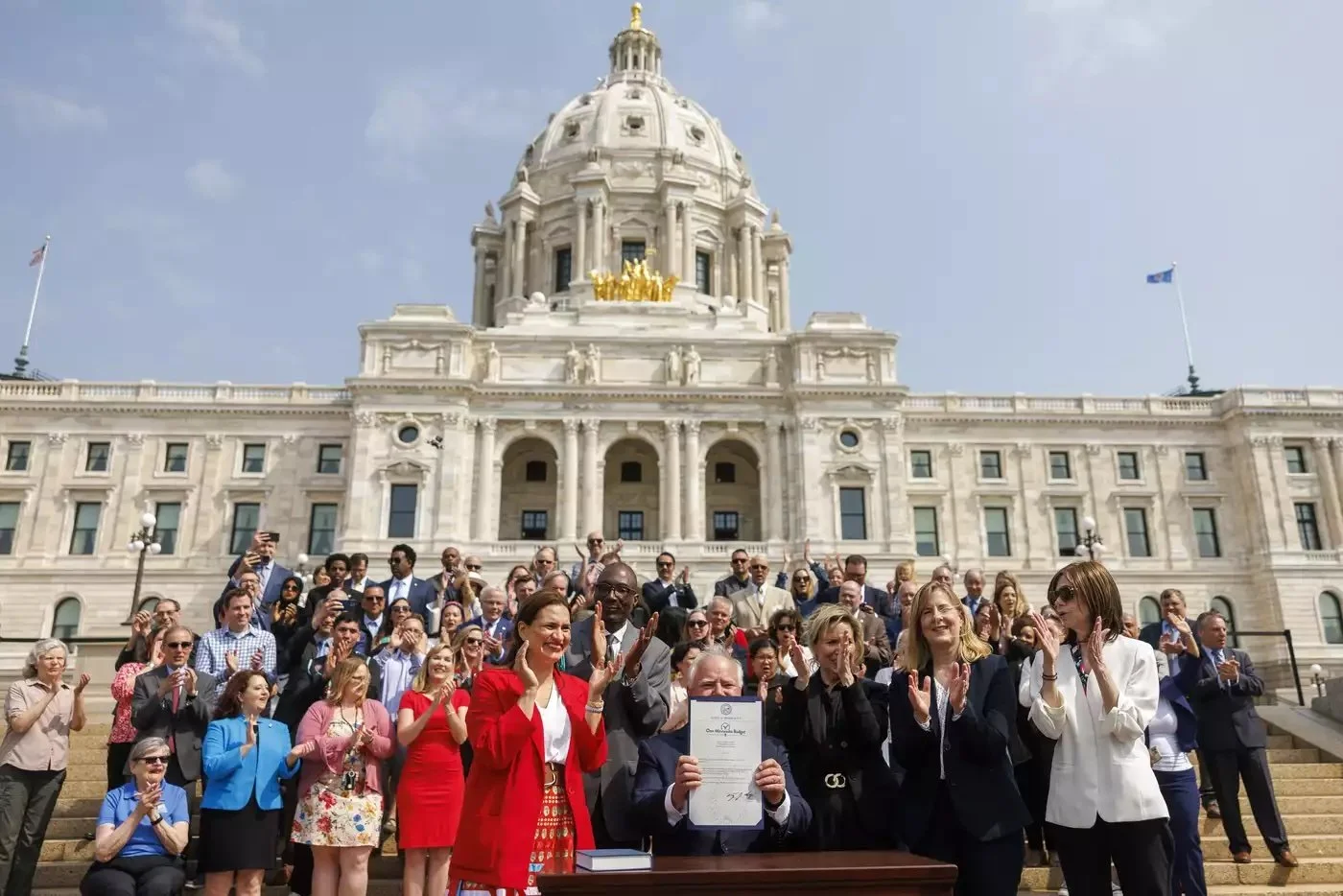Politics
What Minnesotans think of Walz, Flanagan and control of the state’s House of Representatives
Detailed findings from the September 2024 Minnesota Poll
Gov. Tim Walz signed a piece of paper with his “One Minnesota” slogan meant to be representative of the new $72 billion state budget in May 2023, Lt. Gov. Flanagan appears on his right. Photo by Kerem Yücel| MPR News.
by ELISABETH GAWTHROP | Sept. 24, 2024
In partnership with Minnesota Public Radio News, the APM Research Lab analyzed the results of a statewide poll of likely voters in Minnesota. The “Minnesota Poll” was conducted Sept. 16-18, 2024 by Mason Dixon Polling and Strategy, on behalf of MPR News, the Minnesota Star Tribune and KARE11. Click here for additional background on the poll’s methodology.
SEPTEMBER 2024 MINNESOTA POLL COVERAGE
Sept. 23
Lab: Presidential and Senate race results, key voting issues and methodology
MPR News: Harris up on Trump but not by much as Democratic enthusiasm spikes
MPR News: Klobuchar with comfortable lead in U.S. Senate race
Sept. 24
MPR News: Walz approval rating holds steady amid VP run, has narrow edge in favorability
Sept. 25
Lab: Minnesotans’ plans for voting and thoughts on election security
MPR NEWS: Broad confidence of accurate vote count, but deep split over absentee voting
Lab: Minnesotans’ cannabis use and views on legalization
MPR News: Only small fraction of Minnesotans say they’ve used cannabis recently despite legalization
Sept. 27
MPR News’ Politics Friday: Poll shows Harris with narrow Minnesota lead, but what else can we glean from it?
Minnesotans’ overall views of Tim Walz
Minnesota voters are split on whether they have a favorable or unfavorable opinion of their governor – who became the Democratic vice-presidential candidate just over a month ago. The September MPR News | Star Tribune | KARE11 Minnesota poll shows that Gov. Tim Walz is viewed favorably by 48% of voters and unfavorably by 47%. Five percent are not sure.
Given the margin of error associated with the survey findings, Minnesota voters’ impressions of their governor are very similar to both former President Trump and current Vice President Harris. Somewhat more voters, 10%, indicate they are unsure about Sen. JD Vance, Walz’s counterpart on the GOP ticket. Additionally, Trump’s unfavorability rating of 53%, is somewhat higher than that of Walz.
Walz’s net favorability rating — the percent of people reporting a favorable opinion minus the percent reporting an unfavorable one — is +0.9 percentage points in this poll. He is the only candidate on the two major tickets with a positive net favorability rating. Donald Trump has the lowest favorability rating at -6.5 percentage points.
Walz’s job approval rating is a little bit higher, at 53%, than his favorability rating. This metric is based on a question that asks whether respondents approve or disapprove of his performance as Minnesota’s governor.
Walz’s net job approval rating - the percent who approve of his performance minus the percent who disapprove - is nine percent in this poll. That’s a bit lower than the 13 percent net approval rating reported by Morning Consult in July, which placed him as the nation’s the 36th most popular governor.
The June Minnesota Poll found both former President Trump and President Biden had negative net job approval ratings with Minnesota voters – negative five percentage points and negative seven percentage points, respectively.
Gov. Walz has consistently logged positive net approval ratings, and he notched his highest approval rating near the beginning of the pandemic, with a 65% approval rating in May 2020. His lowest approval rating was in 2021, at 49%. Since then, it has gone up slightly and now sits at 53%.
Approval ratings of Walz’s performance on the pandemic, civil unrest and his work with the Legislature
Walz’s overall approval rating is higher than the approval rating for any of the three specific issues polled: his handling of the COVID-19 pandemic, his handling of the protests and riots that followed the killing of George Floyd by Minneapolis police, and the way he governed along with leadership of the state Legislature after the 2022 elections that resulted in a Democratic trifecta, or control of the House, Senate and Governor’s office.
Among ratings of these three issues, Walz scores worst on the handling of the protests (44% approve) and best for handling of the pandemic (52%).
Voters identifying as Democrats are nearly unanimous in their approval of Walz’s handling of the pandemic and especially the way he and the DFL-controlled Legislature have governed. Twelve percent of Democrats disapprove of the way he handled the protests and riots following George Floyd’s murder.
Republicans are nearly unanimous in their disapproval of Walz’s performance in all three areas.
Independents are mixed, on net approving of his performance during the COVID-19 pandemic, disapproving of his performance during the 2020 protests, and very evenly split on approving and disapproving the way he and the legislature have governed since gaining the Democratic trifecta in 2022.
A closer look at independents
While Minnesotans overall give Governor Walz the highest net favorability rating overall among the presidential and vice-presidential candidates, the pattern does not hold for independents, who gave Trump the highest net favorability rating, with -2.9 points. That’s followed by Sen. JD Vance with a -5.1 point net favorability rating, then Walz at -8.3 and Harris at the bottom with -15.2.
But, even though independents on balance don’t have a favorable opinion of Walz, they do overall approve of his job performance as governor. Fifty-two percent of independents approve of how Walz has performed as governor, which translates to a nine percentage point net approval rating among independent voters in Minnesota.
For details and a continually updated look at the polling trends in the state this election cycle, see: Minnesota Poll Watch 2024 (MPR News).
How various groups of Minnesota voters feel about Walz
Demographic groups that typically have a higher proportion of DFL-friendly views, such as those residing in Hennepin and Ramsey counties and Black, Indigenous and people of color (BIPOC) voters, have predictably higher approval ratings for Walz.
These patterns hold true when looking at the approval ratings associated with Walz’s handling of the COVID-19 pandemic, the 2020 protests and riots that followed the killing of George Floyd by Minneapolis police, and the way he governed alongside of the DFL-controlled Legislature. For example, the proportion approving of Walz’s performance on all three issues is roughly 25 percentage points higher among BIPOC voters than it is among white voters.
While a higher percentage of women than men approve of Gov. Walz’s job performance and have a favorable opinion of him, the difference falls mostly along party lines. Recent national data from Gallup suggests women are becoming more liberal, while men are staying about the same.
The Sept. Minnesota Poll finds that far fewer male than female voters have a favorable opinion of Gov. Walz (38% compared to 57%). Looking only at voters who identify as Democrats, however, over 9 in 10 men have a favorable opinion of Walz, virtually identical to women who are Democrats. The reverse is true among Republicans. And among independents it appears that a higher percentage of men than women have favorable opinions of Walz — although that 3 percentage point difference is not statistically meaningful given the poll’s margin of error.
How Minnesotans view Lt. Gov. Peggy Flanagan
Results released Sept. 24, 2024
Nearly half of Minnesota voters — a plurality — are not sure of their opinion of Lt. Gov. Peggy Flanagan, who will become governor of the state should Walz be elected U.S. Vice President. Among those who feel they know enough about her to weigh in, 35% approve and 18% disapprove, giving her a strong net approval rating of +17 percentage points.
Independent voters and those in the suburban and exurban counties surrounding Hennepin and Ramsey counties are least sure of their opinion of Flanagan. Even among DFL voters, nearly a third are not sure whether they think favorably or unfavorably of Flanagan. More than two-thirds of DFL voters do rate her favorably, however, and only one percent unfavorably.
Other than Democrats, BIPOC voters and those in Hennepin and Ramsey counties gave her the highest favorability ratings, at 47% and 46%, respectively.
Control of the Minnesota House is up for grabs
The DFL has had majority control of the Minnesota House of Representatives since 2019, most recently maintaining a six seat majority in the 2022 election. This fall all 134 seats are on the ballot once again. Each seat is elected by the vote of its local district and not by statewide referendum. Still, to gain a sense of voter sentiment toward control of the House, the September Minnesota Poll included a so-called generic ballot question about the chamber.
MPR News: 2024 voter help desk
The results show Minnesota voters very closely divided in their preference. Among all respondents, 48.5% would prefer Democrats to retain control of the House, while 48% would prefer Republicans to be in charge. That leaves 3.5% who are not sure who they would prefer.
The largest group of undecided voters are independents, with eight percent not yet sure which party they would like to win the House. Of those independents who do have a preference, 50% are for Republicans and 41% are for Democrats.
Likely voters who affiliate with one of the two parties overwhelmingly chose their own party as their preference.
Half or more of men, those age 50 or older, white voters, those without a four-year degree and those living outside of Hennepin and Ramsey counties would prefer Republicans to win control of the House. DFL control is preferred by a majority of women, voters less than 50 years old, and BIPOC voters as well as those with a four-year college degree and those residing in Hennepin and Ramsey counties.

